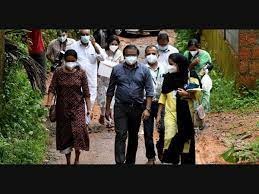Kozhikode: The Nipah epidemic has resulted in a drop in sales of locally cultivated fruits
Because the public is primarily refraining from purchasing locally cultivated fruits like guava, dragon fruit, and rambutan, Kozhikode’s small and large-scale fruit growers, particularly those from the eastern mountainous portions of the district, are concerned. The initial outbreak of the illness in 2018 followed a similar pattern of decreased sales of locally produced fruit as a result of the Nipah epidemic in the Kerala area.

Fruit bats, which are known to eat fruits like guava and rambutan, are the main carriers of the Nipah virus.
On a 1.5 acre plot of land, Jose Kannanchira, a farmer in the Maruthonkara panchayat, grows rambutan. The fruit will be ready for picking in approximately two weeks. However, because of the outbreak’s negative impact on sales, he has not yet received a favorable reaction from wholesale wholesalers.
“The straightforward explanation is that people don’t want to consume fruits like rambutans because of worries of Nipah. To prevent bats from stealing the fruits, I have taken the required measures, such as covering the trees with nets. But people continue to be terrified. This time, I’m looking at a loss of around two lakh rupees,” he stated.
“I earned around 2.5 lakh rupees from the vegetables last year. People were making immediate purchases from the field, he said.
Another farmer called K Joy from nearby Kavilumpara, who grows exotic fruits, has asked the chief minister and the district collector to provide financial support to others like him.
Retailers in Kozhikode city reported dramatic drops in the recent two days’ sales of regional fruits.
The manager of a retail fruit store, Sabith, reported a 60% decrease in sales of fruits including guava, rambutan, and sapodilla. People are afraid because these fruits originate from nearby neighborhoods and nearby regions. They want to purchase foreign apple and orange cultivars.
“We are doing very well on imported fruits, but people are not buying those coming from local markets,” said Ashish, who owns a store in the city named Frootree. Even widely available kinds like the Njalipoovan banana are struggling. Farmers and merchants suffer if this continues.







